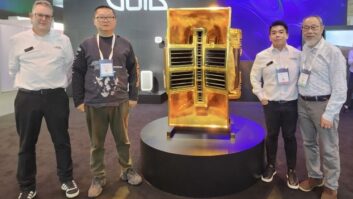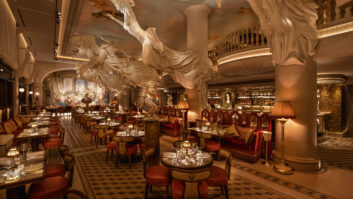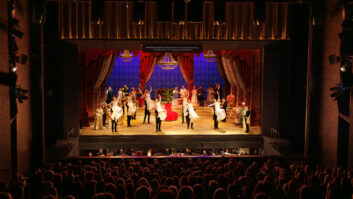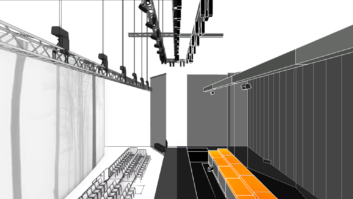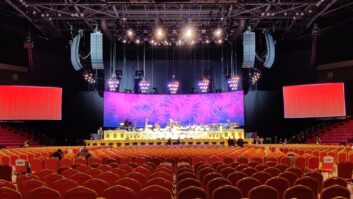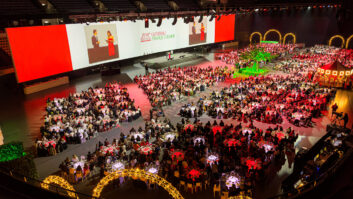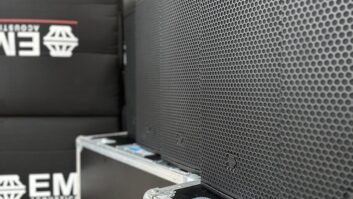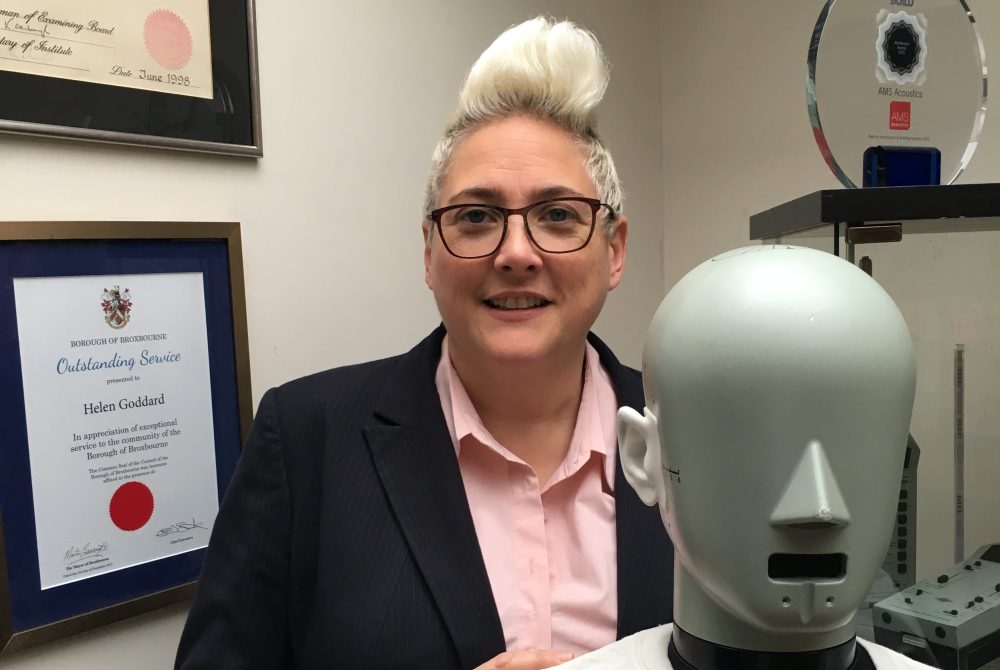
More than two decades on from the start of her career, AMS Acoustics principal and MD Helen Goddard remains a prominent and passionate advocate for the wider understanding of electro-acoustics. And as she tells David Davies, modern architectural practices and increased levels of hearing damage mean that the surrounding debate is set to become even more acute…
Helen Goddard is describing the way that “people just seem to fall into acoustics” rather than deliberately seek it out, underlining her point by noting that “we have a room full of musicians here, with the exception of one team member from a telecoms background, but even he studied the cello.” But once people have ‘fallen into’ acoustics, there is often no stopping them: “It can very quickly become a passion – it certainly did for me.”
[With] the looming possibility of an epidemic of hearing damage… it could be that in 20 years’ time we have to completely rethink the speech spectrum
Having determined that a full-time career as a classical pianist wasn’t her destiny, Goddard began working as a junior technician at AMS Acoustics in 1995. Thereafter, her ascent through the ranks was rapid; she became the owner and MD in 2000 and oversaw the expansion of the company to its current 10-strong team of full-timers. She is also very active in industry bodies such as the Institute of Sound and Communications Engineers (ISCE), and has been involved in helping the organisation to achieve the right to assess and issue Electrotechnical Certification Scheme (ECS) approval for sound engineers – more of which anon. But the starting point for Installation’s conversation with Goddard was her own unexpected initiation into the world of acoustics back in 1995…
So how did you come to enter the world of acoustics?
I trained as a classical musician, studying piano, but I came to realise that I would eventually have to get a ‘proper job’ at some point to sustain me and be able to do all the things my ‘grown-up’ friends could do! I was good at music, but not marvellous at it, and in terms of a career the reality was that it wasn’t going to take me anywhere.
I could have become a music teacher, but to be honest I couldn’t think of anything worse! So I started to look around for other options, and it was through this search that I eventually began working as a junior technician at AMS Acoustics. It felt like I was a bit of a latecomer to the sector, but once I had found it I was right out of the starting blocks. It became a passion – almost a calling, really – and the urge to learn and move forward with my understanding of the discipline was kind of unstoppable!
So by 1998 I had completed my Institute of Acoustics postgraduate Diploma in Acoustics and Noise Control, and had also become active in organisations such as the ISCE.
Do you think your musical background meant that you were more conducive to quickly getting to grips with acoustics?
It’s an interesting point. As a musician you are obviously aware of acoustics; for example, there is a huge difference between an upright piano that you might play at home and a grand piano in a concert scenario. But your perception is more in artistic terms, so to then move into this sector and gain an understanding from a technical perspective was fascinating to say the least.
Within five years of joining AMS Acoustics you were at the helm – but this rapid ascent was in part due to a tragic development at the company…
Yes – it was a very sad set of circumstances. The owner Peter Barnett passed away very sadly and unexpectedly. There was the possibility that a corporate engineering company could buy us, and that concerned me as I had already realised by then that I was a bit too ‘maverick’ to fit into a big corporate structure. Fortunately, AMS’ bank manager took me to one side and said that I was already effectively running the electro-acoustics wing anyway, and that if I applied to the Small Firms Loan Guarantee Scheme I would be able to match the other company’s offer and buy AMS myself. So being young and naive, I thought ‘yes’ and went for it!
It was pointed out to me at the time that this is when I would find out whether I was an entrepreneur as well as an acoustician, and I am glad to say that that has proven to be the case. I do think I am willing to take more risks than some people would be, hence the fact that we do a great deal of research here. If we have an idea we go right ahead and start exploring and experimenting.
In which primary ways has the composition and geographical spread of your work changed during the last decade?
We went through a period of very rapid expansion due to the rise of public-private partnership arrangements, but when the recession struck in 2008 a lot of those contracts stopped overnight. It was at that point that I fully realised we had all our business in one marketplace, the UK, and made a conscious effort to expand globally to some extent. Hence we now do a fair bit of work in the US, Middle East and Far East.
In the pre-recession boom period we were working on major infrastructure projects, such as railway stations, but now it’s more museums and shopping centres. Sports venues have also declined as a part of our work – I think the football clubs are spending money on legs to kick balls rather than on infrastructure! – but I think that will come back in time.
It’s the question to which everyone would love to have a definitive answer, but what impact do you think that Brexit is likely to have on your area of the business?
It’s not hard to envisage the number of public-private partnership-related projects dropping off once again if there is a recession as a result of Brexit. The last recession of 2008-11 really did cut very deep in this industry, and in truth it has never quite got back to its previous levels of activity. So yes, I am concerned about the possibility of a further recession.
The issue of speech intelligibility has arguably enjoyed a greater profile than ever in recent years; has the world become more intelligible?
‘No’ is the short answer! The longer one is that there are a number of reasons why that is true, including the materials that architects use for the sake of modernity, such as steel and glass, not being conducive to good speech intelligibility and resulting in lots of reverberation.
There is also an issue that we might call ‘talker proficiency’ – in other words, how well people can enunciate over a PA. I think the fact that more and more communication is taking place visually is a key factor here, and as a result there is less thought being given to effective sentence structure and the use of robust words.
I would also highlight the rise in popularity of busy canteen-style restaurants where it can be difficult to have an intelligible face-to-face conversation, as well as the looming possibility of an epidemic of hearing damage from personal devices and earphones. It could be that in 20 years’ time we have to completely rethink the speech spectrum and boost the high frequencies in order for people to hear messages in public spaces.
So all in all, it’s not exactly a cheery outlook then! To end on a more positive note, what are the benefits of the ISCE having recently secured the right to assess and issue Electrotechnical Certification Scheme (ECS) approval for sound engineers via a card system?
In conjunction with the Construction Skills Certification Scheme (CSCS), an ISCE sound engineer ECS card will allow sound engineers to prove their identity, qualified status and occupation when they are working on site. The ECS card scheme complies with the requirements of the CSCS scheme in the sense that it is compulsory that all participants must hold an up-to-date health and safety qualification in order to receive a card.
It’s something that we have been pursuing for quite a while, so we are delighted by the approval. As an industry we do want some more recognition for what we do in the workplace as a part of large construction projects. Highlighting the scheme during my presentation at the PLASA Show in September was part of an ongoing effort to draw attention to the scheme. We really hope that people will get behind the initiative and recognise that raising the profile of the pro-audio and AV industries within a wider context can only be a positive development.
Brief biography
• Helen Goddard joined AMS Acoustics in 1995 as a junior acoustic technician, was made an associate in 1998 and became principal and managing director in 2000
• Key projects include the integration of the PA/VA design at Arsenal FC’s Emirates Stadium; the ExCeL Convention Centre for the London 2012 Olympics; and all Heathrow airport concourses including the Queen’s Terminal
• She regularly chairs meetings at the IOA and ISCE
• A classically trained musician, she teaches musical theatre in a local performing arts charity
